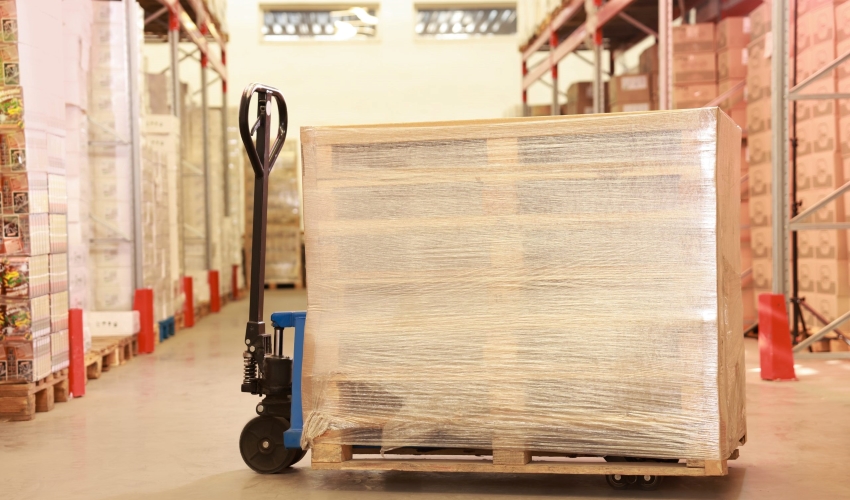
The rising demand for non-plastic pallet wrap highlights a shift toward sustainable logistics. Businesses are reducing environmental impact by switching from conventional plastic wraps to compostable stretch wrap. Made from renewable resources, plant based pallet wrap offers a sustainable alternative, matching the stretchability and durability of traditional films while decomposing naturally in composting environments. Many of the best plant based pallet wrap options now come from innovative brands focused on eco-friendly packaging. These wraps help secure pallet loads effectively while promoting greener supply chains through the use of various pallet-wrapping techniques that optimize both sustainability and load stability. Plant based pallet wrap is a sustainable, eco-friendly solution made from renewable resources like sugar cane, 100% compostable, biodegradable, and designed to protect both the earth and your products.
Why Choose Our Stretch Film Over Competitors?
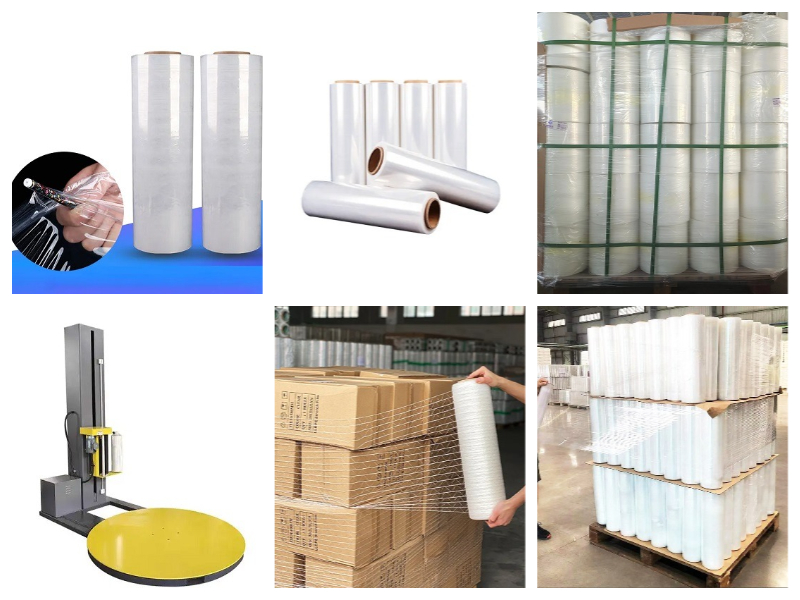
Plant based pallet wrap is a sustainable alternative to traditional plastic pallet wraps, made primarily from renewable resources such as sugarcane, cornstarch, or other biodegradable plant-based materials. Unlike petroleum-based films, plant-based options significantly reduce environmental impact by lowering carbon emissions and avoiding the use of fossil fuels. These wraps are designed to offer the same functionality as conventional stretch wraps, providing secure load stabilization, puncture resistance, and stretchability while being eco-friendly.
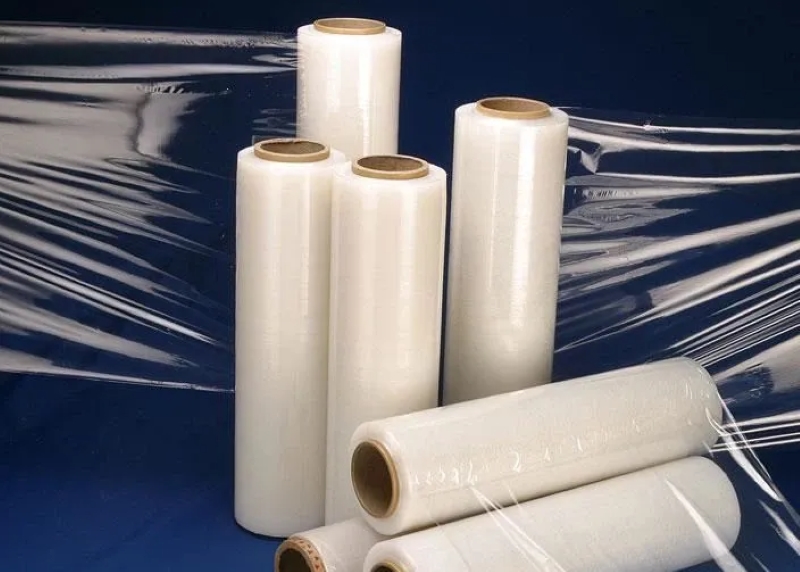
Industrial Use vs. Food-Grade Use
While both compostable cling wrap and plant based pallet wrap share plant-derived origins, they differ significantly in their applications. Compostable cling wrap is primarily intended for food storage, ensuring freshness by creating an airtight seal around food items. In contrast, plant based pallet wrap is designed for industrial use, such as stabilizing pallets and bundling large shipments for transport or storage. These pallet wraps are formulated to withstand heavier loads and provide enhanced stretch capabilities, ensuring that goods remain intact during transit. This distinction ensures that each type of wrap meets the specific needs of its respective use case, offering targeted performance and environmental benefits.
Plant based pallet wrap offers several important advantages over conventional plastic wraps, making it an ideal choice for businesses seeking sustainable packaging solutions. Below are the key benefits that highlight its environmental and operational advantages.
Plant-based pallet wrap is a sustainable innovation designed to minimize environmental harm while maintaining the functionality of traditional stretch films. Unlike conventional plastic wraps that can persist in the environment for decades, this biodegradable alternative naturally decomposes into harmless components such as carbon dioxide, water, and biomass under proper conditions. By reducing plastic waste, it helps protect natural habitats, safeguarding wildlife and preventing pollution in areas like countryside hedges and coastlines. Its ability to break down after use significantly reduces its impact on the environment, contributing to a cleaner, healthier planet for future generations.
A key advantage of plant-based pallet wrap is its reduced reliance on fossil fuels. Rather than using petroleum, it is manufactured from renewable plant-derived materials like sugarcane or cornstarch, which produce fewer carbon emissions during production. This shift supports global sustainability efforts, helping businesses reduce their carbon footprint while contributing to the fight against climate change. By combining biodegradability with renewable resources, plant-based pallet wrap is a forward-thinking solution that promotes environmental stewardship without compromising performance.
Plant-based pallet wrap stands out for its compostability, offering a sustainable solution that significantly reduces environmental impact. Unlike traditional plastic wraps that can take hundreds of years to decompose, this innovative material breaks down naturally within a few months when disposed of in a proper composting environment. This feature aligns seamlessly with zero-waste initiatives by preventing accumulation in landfills and contributing to efficient waste management. By degrading into organic matter, plant-based pallet wrap plays an active role in waste reduction while ensuring its life cycle has minimal ecological harm.
The composting process of plant-based pallet wrap not only supports waste diversion but also contributes positively to combating climate change. In composting facilities, the material decomposes quickly and enriches the soil with valuable organic matter, promoting healthier ecosystems. Additionally, diverting this material from landfills helps to significantly reduce methane emissions, a potent greenhouse gas released during the anaerobic decomposition of organic waste in landfills. By integrating eco-conscious design with practical functionality, plant-based pallet wrap not only fulfills its role in packaging but also enhances sustainable waste management practices for a healthier planet.
By using plant based pallet wrap, companies can avoid the environmental issues caused by microplastics. Traditional plastic wraps can degrade into harmful microplastics, which contaminate ecosystems and water sources. In contrast, plant-based alternatives leave no toxic residue, making them safer for the environment and easier to dispose of responsibly.
Plant-based pallet wrap is made using polymers that are widely recyclable around the world. This ensures the material can be processed and repurposed, reducing the demand for virgin plastic production. Businesses using recyclable pallet wrap align themselves with global sustainability goals, lowering their carbon footprint while securing goods during transport or storage. Recycling also helps conserve resources and prevents waste from accumulating in landfills or natural habitats.
Despite its eco-friendly composition, plant based pallet wrap delivers the same stretchability and durability as conventional plastic wraps. It performs well under pressure, providing a secure and stable load during transport and storage. This ensures that businesses can adopt sustainable practices without sacrificing operational efficiency, maintaining the integrity of their goods throughout the supply chain.
Plant based pallet wrap offers a sustainable and effective alternative to traditional pallet wraps by combining environmental benefits with high performance, helping companies improve their packaging operations while reducing their environmental impact.on that contributes to reducing plastic waste while ensuring effective protection for pallet loads. Businesses can make informed choices by considering the specific attributes of each plant-based pallet wrap, including compostability and performance, to find the best fit for their packaging needs.
Several brands are leading the way in providing high-quality plant based pallet wrap, offering eco-friendly solutions for businesses looking to reduce their environmental impact. These brands focus on combining sustainability with performance, ensuring their wraps meet industrial standards while supporting greener supply chains.
PWP Stretch Film has established itself as a pioneer in sustainable packaging, offering both compostable cling wrap and plant based pallet wrap for sale. Known for its innovation, PWP Stretch Film produces pallet wraps made primarily from renewable resources, such as potato waste and cornstarch. Their wraps offer the same stretchability and strength as traditional plastic films, providing excellent load stability during transport. PWP Stretch Film emphasizes easy application, ensuring compatibility with both hand wrapping and machine wrapping operations. This brand has become a go-to solution for businesses committed to eco-friendly packaging, offering reliable, compostable options to replace conventional plastic wraps.
In addition to PWP Stretch Film, several other innovative companies are developing non-plastic pallet wrap alternatives to meet the growing demand for sustainable packaging. These emerging brands are actively pushing the boundaries of eco-friendly technology, focusing on wraps made from bio-based materials and recyclable components. Some focus on improving the strength and stretch capacity of their products, ensuring that even large shipments remain secure during transit. Others specialize in offering affordable plant based pallet wrap for sale, making it easier for small businesses to adopt sustainable practices.
These companies are helping shift the packaging industry away from petroleum-based materials by offering practical, high-performance alternatives that align with global sustainability goals. Together, they are providing businesses of all sizes with access to plant based pallet wrap, allowing them to transition smoothly to greener, more responsible packaging solutions.
If you’re looking to switch to sustainable packaging, finding the best plant based pallet wrap is essential. With increasing demand, several online marketplaces and specialized suppliers now offer eco-friendly wraps that meet industrial needs without compromising quality. Below is a guide to help you locate plant based pallet wrap for sale from trusted sources.
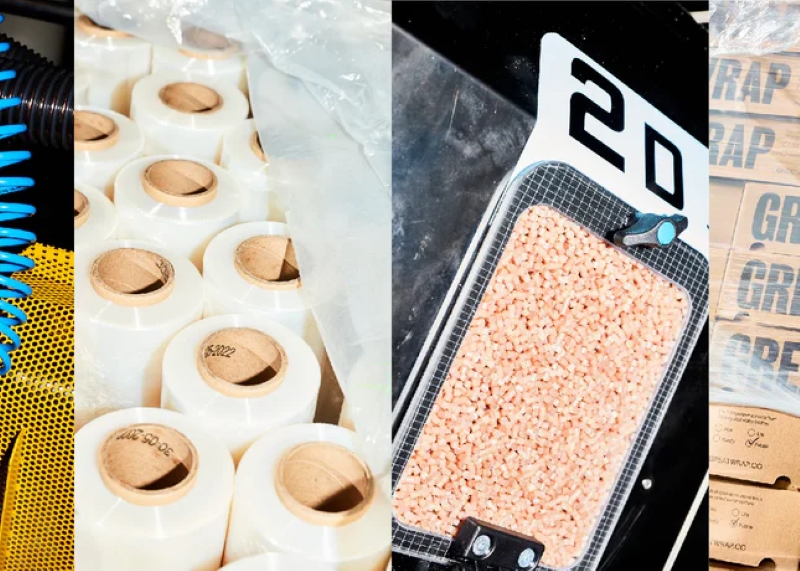
Major e-commerce platforms are expanding their sustainable packaging selections, making it easier to access plant based pallet wrap. Websites such as PWP Stretch Film and specialized eco-friendly marketplaces now list various plant based pallet wrap for sale. These platforms offer a wide range of options, allowing you to compare brands, sizes, thicknesses, and pricing to suit your business needs. Shopping online also enables quick delivery and the ability to read reviews from other users, ensuring you make an informed choice.
In addition to online marketplaces, eco-conscious suppliers specialize in high-performance plant based pallet wrap. One of the leading options is PWP Stretch Film, a trusted supplier known for offering durable, sustainable alternatives to plastic wraps. PWP Stretch Film’s products are designed for both manual and machine wrapping and boast excellent stretchability, ensuring secure packaging during transport.
Many other sustainable brands offer direct purchasing through their websites, providing custom bulk orders and flexible pricing plans. These suppliers often support subscription services for businesses that need frequent restocking, helping maintain an uninterrupted packaging supply.
For those seeking immediate access to plant based pallet wrap, local distributors and packaging retailers may carry eco-friendly options. Some packaging stores now prioritize sustainable products, offering plant-based wraps alongside traditional big plastic wrap options for those who still prefer the larger, more industrial packaging solutions. Buying locally not only supports sustainable practices but can also reduce carbon emissions from shipping.
By choosing the best plant based pallet wrap from reputable sources, businesses can transition smoothly to sustainable packaging while maintaining operational efficiency. Whether you purchase online or through local suppliers, incorporating eco-friendly pallet wraps into your logistics operations is a step toward a greener future.
Plant based pallet wrap offers versatile packaging solutions that suit a wide range of industries. Its ability to combine environmental benefits with high performance makes it an excellent choice for companies committed to sustainable operations. Below are some key use cases and applications for plant based pallet wrap across various sectors.
In warehousing and freight transport, plant based pallet wrap ensures that palletized loads remain stable during storage and shipment. Its stretchability and puncture resistance secure products on pallets, preventing shifts and damage throughout the supply chain. Many logistics companies are adopting this eco-friendly solution to maintain operational efficiency while reducing their carbon footprint. By switching to plant-based alternatives, warehouses can align with sustainability standards without compromising packaging performance.
For e-commerce platforms and retail businesses, plant-based pallet wrap plays a critical role in sustainable packaging strategies. Companies striving to reduce plastic usage while maintaining effective shipping processes can use plant-based wraps for bundling packages and stabilizing bulk shipments, including the use of Bundling Stretch Film for added security and efficiency. As customers become more environmentally conscious, businesses benefit from adopting packaging materials that reflect these values. Plant-based pallet wrap helps enhance brand reputation by demonstrating a commitment to eco-friendly practices, attracting eco-aware consumers.
Plant-based pallet wrap works seamlessly with both manual wrapping and automated pallet-wrapping machines, including advanced systems that utilize Machine Stretch Film, making it suitable for diverse industrial applications. It offers the flexibility needed to wrap irregularly shaped or heavy products securely, ensuring goods remain intact during transport and storage, especially when using pallet heat shrink wrap for added protection and stability. The wrap’s compatibility with various machines, including those designed to work with Machine Stretch Film, ensures that companies can integrate it into existing operations with minimal adjustments.
Whether used in warehouses, retail stores, or industrial settings, plant based pallet wrap provides reliable performance, enabling companies to transition smoothly to sustainable packaging practices.
Plant-based pallet wrap is an innovative, eco-friendly alternative to traditional stretch film. Designed with sustainability and performance in mind, it offers a range of features that make it a practical choice for businesses looking to reduce their environmental impact. Here’s a detailed introduction to its key features:
This wrap comes with a standard 3-inch core, ensuring compatibility with most stretch wrap dispensers and equipment. This makes it a seamless replacement for conventional stretch film without requiring new tools or modifications.
With stretch capabilities of up to 150%, this pallet wrap provides excellent load stability and optimal coverage. Its high stretchability ensures efficient usage, reducing waste while maintaining tight and secure wrapping.
The material is designed to remain stable when stored and used indoors. It resists temperature fluctuations, ensuring reliability and performance even in varied warehouse conditions.
For larger businesses or bulk orders, full pallet purchases ship for free. This benefit lowers costs for high-volume users, adding value to the already sustainable product.
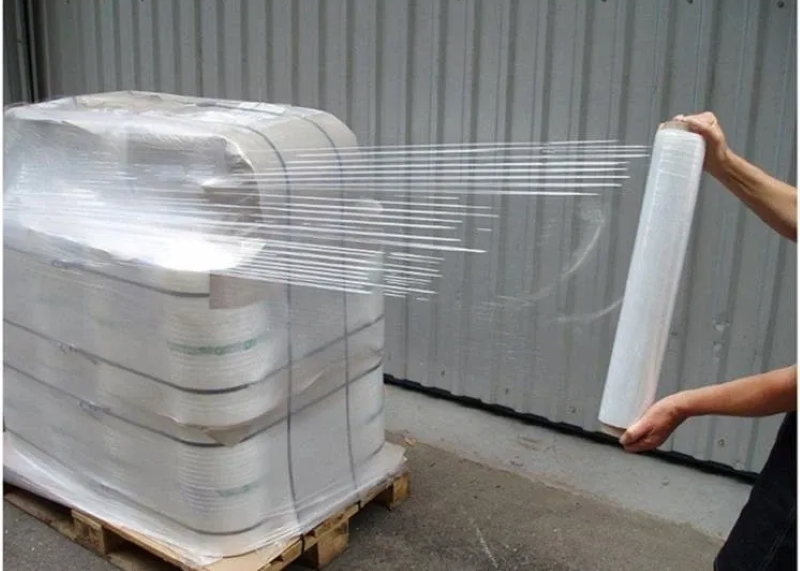
The performance of this plant-based wrap matches that of traditional petroleum-based wraps. Businesses can switch to this eco-friendly option without sacrificing strength, durability, or convenience.
One of the standout features of this wrap is its ability to fully biodegrade after disposal. It undergoes a bio-transformation process, breaking down into natural components without leaving harmful residues. This significantly reduces its impact on the environment compared to conventional plastics.
Plant-based pallet wrap combines eco-conscious innovation with the performance businesses require. Its compatibility with standard equipment, high stretchability, and biodegradability make it an excellent solution for companies aiming to adopt sustainable practices without compromising efficiency.
Choosing the right plant-based pallet wrap is crucial for ensuring proper packaging, cost efficiency, and customer satisfaction. With various options available, considering the following factors will help you select the most suitable wrap for your needs:
Consider the type of goods being secured. Are you wrapping food pallets for distribution or heavier, industrial items?
Lighter goods may require thinner, more flexible wraps, while heavier items might need thicker, more durable wraps with higher tension.
Determine the volume of goods you wrap daily.
If you wrap more than 15 pallets per day, a machine-compatible plant-based wrap may save time and labor costs. For fewer pallets, hand wraps could be more economical.
Are the items irregularly shaped or uniform? Irregular loads may benefit from wraps with higher elasticity for better containment.
For food or eco-sensitive products, ensure the wrap meets industry standards for compostability and biodegradability.
Not all plant-based pallet wraps are the same. Some are designed for light-duty applications, while others are engineered for heavy-duty or high-volume usage. Choosing the right type can reduce material waste, lower costs, and improve operational efficiency.
By considering the type of goods, daily usage, and load characteristics, you can select a plant-based pallet wrap that aligns with your operational needs, ensuring optimal performance and sustainability.
Traditional pallet wrap, also known as stretch wrap, is commonly made from polyethylene, a type of plastic that contributes to environmental pollution. An eco-friendly alternative is biodegradable or compostable wrap made from plant-based materials such as PLA (Polylactic Acid), which is derived from renewable resources like corn starch or sugarcane. These alternatives decompose much faster than plastic and reduce the amount of waste in landfills, making them a more sustainable choice for securing pallets during transportation and storage.
Plant-based cling wrap is an eco-friendly alternative to traditional plastic cling films, made from renewable resources like corn or potato starch. Unlike conventional cling wraps, which are derived from fossil fuels, plant-based versions are compostable and biodegradable, breaking down in a matter of months under the right conditions. This type of cling wrap is designed to be as functional as traditional ones, offering similar levels of flexibility, durability, and adhesive properties but with a significantly reduced environmental impact.
Cling wrap and pallet wrap serve two distinct purposes and are made differently. Cling wrap is designed for food preservation and is typically used in kitchens to cover dishes, protecting food from air and moisture to keep it fresh. It is thin, flexible, and sticks to itself and food containers easily. Pallet wrap, or stretch wrap, on the other hand, is a highly stretchable plastic film that wraps around items on a pallet. Its primary purpose is to secure and stabilize products during transport or storage, preventing them from moving or getting damaged. Pallet wrap is typically thicker and more durable than cling wrap and does not necessarily have adhesive properties since its stretching ability provides the needed hold.
Not all pallet wrap is food grade. Food-grade pallet wrap is specifically designed and manufactured to come into direct contact with food products, following stringent regulations to ensure safety and hygiene. It must be free from harmful chemicals that could leach into the food. Regular pallet wrap is intended for securing goods on pallets for transportation and storage and may not meet these safety criteria. Therefore, when wrapping items that will come into direct contact with food, it’s essential to ensure that the pallet wrap used is explicitly labeled as food grade.
Plant-based cling wrap is an eco-friendly alternative to traditional plastic wrap, made from renewable resources like sugar cane, corn starch, or other plant-derived materials. It offers the same functionality as regular cling wrap, such as flexibility and adherence to surfaces, but with significantly reduced environmental impact. Designed to be compostable and biodegradable, plant-based cling wrap breaks down into natural components like water, carbon dioxide, and biomass when properly disposed of. For pallet applications, it is used to secure and protect goods while maintaining sustainability goals.
Eco-friendly wrapping film refers to packaging materials designed to minimize environmental impact. Plant-based pallet wrap is an example, made from renewable, biodegradable resources like sugar cane or corn starch. These wraps are 100% compostable and offer an environmentally responsible solution for securing pallets. Unlike traditional plastic wraps, eco-friendly films decompose naturally, reducing plastic waste and promoting sustainability.
Pallets are commonly wrapped with stretch film, which secures and stabilizes items during transport and storage. Plant-based pallet wrap is an eco-friendly alternative to traditional plastic stretch films. Made from renewable resources, it provides the same strength and elasticity while being biodegradable and compostable. This sustainable option ensures load stability and environmental responsibility, protecting both products and the planet.
Pallet wrappers use stretch film to stabilize and secure items on pallets. These machines rotate the pallet while stretching the film tightly around the load. When using plant-based pallet wrap, the process remains the same, but the material used is biodegradable and sustainable, ensuring the wrapping process supports eco-friendly practices.
Yes, polyolefin is widely regarded as food-safe and is often used for shrink wrapping food products. However, for eco-conscious alternatives, plant-based pallet wrap made from renewable resources like corn starch offers food-safe options that are biodegradable, reducing environmental impact while maintaining product safety.
Biodegradable cling film, including plant-based pallet wrap, is made from renewable resources such as sugar cane, corn starch, or polylactic acid (PLA). These materials break down naturally into carbon dioxide, water, and biomass under composting conditions, offering an eco-friendly alternative to traditional plastic wraps.

My name is James Thompson, and I’m the editor of this website dedicated to Stretch Film, Pallet Wrap, and Stretch Wrap products.
My passion for packaging began when I noticed the challenges companies face in securing their products efficiently for transportation and storage. This inspired me to delve deep into the world of stretch films and pallet wraps, exploring the latest technologies and best practices.
I aim to provide valuable insights, practical tips, and up-to-date industry trends to assist you in making informed decisions. Whether you’re a small business owner or part of a large corporation, my goal is to support you in optimizing your operations and ensuring your products reach their destination safely.
Thank you for visiting, and I look forward to accompanying you on your journey toward better packaging solutions.
Comments are closed